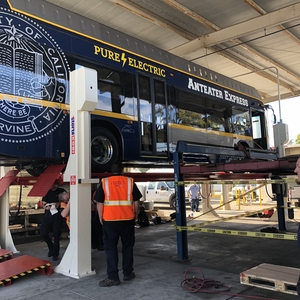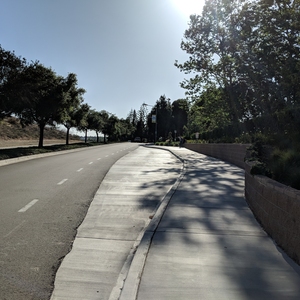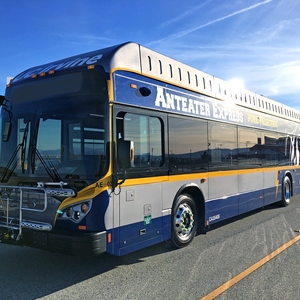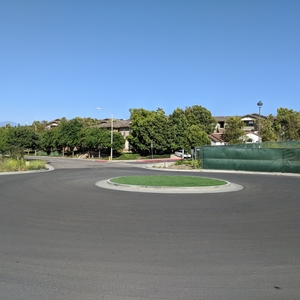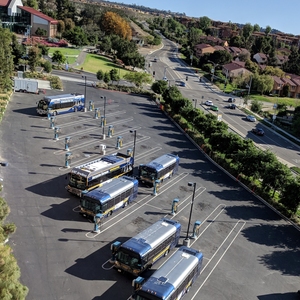UCI Bus Love: UC Irvine’s Transition from a Bio-Diesel to Electric Transit Fleet
University of California, Irvine
Project Overview
The University of California, Irvine (UCI) is the first college campus in the nation to transition over to a fully-electric bus fleet. The student-funded-and-operated Anteater Express campus shuttle service has already acquired 15 electric buses from BYD (Build Your Dreams); with the delivery of the remaining five buses, UCI will have 20 full-electric buses, replacing the previous all-diesel fleet.
Anteater Express serves as the primary source of transportation for many students living in nearby housing communities, transporting over 2 million passengers per year. The buses are charged using UC Irvine’s self-generating microgrid, which includes a charging station for each new bus.
UCI also welcomed a zero-emissions hydrogen fuel cell bus to its fleet in 2015. It fuels at the UC Irvine Hydrogen Fueling Station, which is the first station of its kind in California.
This important decision to move away from biodiesel vehicles demonstrates UCI’s commitment to exploring innovative technologies for a more sustainable future. More importantly, it demonstrates what a group of determined and socially-conscious students can accomplish when faced with an environmental challenge.
Background
At the University of California, Irvine (UCI), the campus' shuttle system — Anteater Express — is managed by the Associated Students UCI (ASUCI) with supervision by Student Affairs. In 2013, the ASUCI student leadership recognized that the Anteater Express’ fleet of 29 old diesel buses were frequently needing repair (costing over $500,000 per year). Knowing how important the shuttle system is to the campus, ASUCI students proposed a ballot initiative (entitled “Bus Love”) that would fund a replacement fleet for the Anteater Express.
During the Bus Love campaign, ASUCI students tirelessly campaigned to educate the other student voters on the negative outcomes that would occur if additional funding wasn’t granted, including fewer buses on the road, routes being reduced or cut, roadways and parking affected by more students driving to campus, and fewer transportation options for students with disabilities.
The campaign was successful, and in April of 2013 undergraduate students voted to assess themselves a fee to support transportation initiatives. The language for the “Bus Love Referendum” is as follows:
-
The money from this fee will be used for expenses that include, but are not limited to, fleet replacement, disability services, and route expansion. This Initiative differs from the current Measure S fee in that the funds may be spent more broadly and the funds are also overseen by a funding board.
-
The fee shall be subject to the Anteater Express Initiative Funding Guidelines. In accordance with campus policy, 33% of the fee will be returned to financial aid to provide adequate financial aid to support the cost of this fee for all eligible students.
-
The fee will begin in fall 2013 and will be assessed to all registered undergraduate students at the same amount for all quarters including Summer Session. The fall quarter after the fee reaches $40, the fee shall increase annually based on the California Consumer Price Index (CPI) to offset the effects of inflation.
-
Regardless of the department under which Anteater Express resides, the Anteater Express Board shall maintain full oversight over the funds raised by the Anteater Express Initiative in accordance with the Anteater Express Initiative Funding Guidelines.
-
The Anteater Express Board will be responsible for providing an annual report on ridership, financial information and student feedback to the Chancellor.
Once the fee was approved, Anteater Express invited various bus manufacturers to campus to present their equipment and technology to Student Government & Student Media and all interested UC Irvine community members during the fall and winter quarters of the 2014 academic year. A survey was then sent to all undergraduate students to identify their preferred type of fuel technology to replace the diesel bus fleet, and the UCI students selected electric technology as their preferred technology.
Due to the escalating fee structure, moving forward with electric vehicle acquisition was not possible until the 2016 academic year. During that time period, the Bus Love Board met often to learn more about transit systems, buses, fuel types, amortization, benefits of buying vs. leasing, bus mechanics, the cost of maintenance, and much more.
Finally, after certain conditions were met by UC Irvine administrators (such as approval for infrastructure and a location to charge the electric fleet using UC Irvine’s self-generating microgrid), the Bus Love Board approved moving forward with the lease-purchase of 20 electric buses built by BYD (Build Your Dreams). The manufacturer was selected because, at the time, they were the only established manufacturer that offered a plug-in charging system and was approved to receive Hybrid and Zero Emission Truck and Bus Voucher Incentive Project (HVIP) funding.
Goals
Project goals included a complete fleet replacement of UCI’s aging diesel fleet with zero emissions transit buses; the ability to charge the buses using the UC Irvine self-sustaining micro-grid; and decommissioning all of the diesel transit buses, using a certified South Coast Air Quality Management District (SCAQMD) salvage center to ensure that UCI’s old diesel fleet will not be used elsewhere in the future. In doing so, the Bus Love project reduced emissions related to the 130 thousand gallons of diesel fuel that Anteater Express used in a calendar year.
Implementation
During the voting process, ASUCI convinced the student body that it was each student’s personal responsibility and in their interest to fund a new fleet of cleaner and more reliable buses for the Anteater Express. In addition, the initiative established the student-majority Bus Love Board to determine how funds should be spent.
After the vote to acquire the new fleet and before signing the lease-purchase with BYD, the Bus Love Board worked to ensure that approval for three necessary infrastructure projects occurred:
-
Campus approval for a bus yard with the ability to connect to the UC Irvine microgrid.
-
Two road modifications necessary for the larger, heavier electric bus fleet.
-
Heavy duty equipment lift installation at UCI’s fleet garage.
In addition, equipment specifications and add-on technology features were incorporated into the BYD bus build to make the buses more student-friendly.
Timeline
May 2016:
- Bus Love Board approval (contingent on campus approval).
- Student Government & Student Media approval.
- Student Affairs approval.
June 2016:
- UC Irvine administration approval for infrastructure.
August 2016:
- UC Irvine Budget office approval.
September 2016:
- Initial construction planning.
October 2016:
- UC Irvine Purchasing office concludes contract with BYD.
December 2016:
- Initial bus build meeting with BYD.
January 2017:
- Construction infrastructure goes out to bid.
July 2017:
- Bus lot complete.
August 2017:
- Completed buses expected (delayed).
September 2017:
- Road Infrastructure completed.
February 2018:
- First 3 BYD buses delivered.
- Bus lift completed.
May 2018:
- BYD delivery 15 buses (current).
- Diesel fleet (25 buses) decommissioned, using a SCAQMD-certified decommissioning process.
- BYD delivery of the remaining 5 buses (expected).
Financing
All aspects of the project were funded using undergraduate student referendum fees. UCI will lease-purchase twenty 40-foot BYD electric buses, which will cost approximately $20 million over the 12-year lifespan of the buses (including infrastructure). UCI will also receive $2,930,000 in incentives from the California Hybrid and Zero-Emission Truck and Bus Voucher Incentive Project (HVIP). BYD has applied for these rebates on behalf of UCI and will apply the rebates to the lease-purchase, thereby reducing the total 12-year cost.
Results
Year to date, we have fifteen electric buses in service, with the remaining five buses due at the end of May 2018. Anteater Express offers service to the entire campus population of over 43,000 students, staff, and faculty; it is expected to provide over 2.1 million boardings per year.
Lessons Learned
The UCI Bus Love Initiative is a great example of what can be accomplished when students set a priority, organize an action, and choose to work with staff on a project that will benefit the future of a campus. UCI has been contacted by many external entities enquiring about how they might replicate what the Bus Love Board accomplished.
A project of this magnitude requires a lot of cooperation between all parties (students, staff, and administration). Many of the individuals who voted for the Bus Love Initiative or served on the original Bus Love board are no longer at UCI, and even though they knew at the time that they personally would not benefit from these electric buses, they all still chose to pay into a sustainable funding source, plan for the future, build a more sustainable UCI, and be a shining example to all other college campuses.

